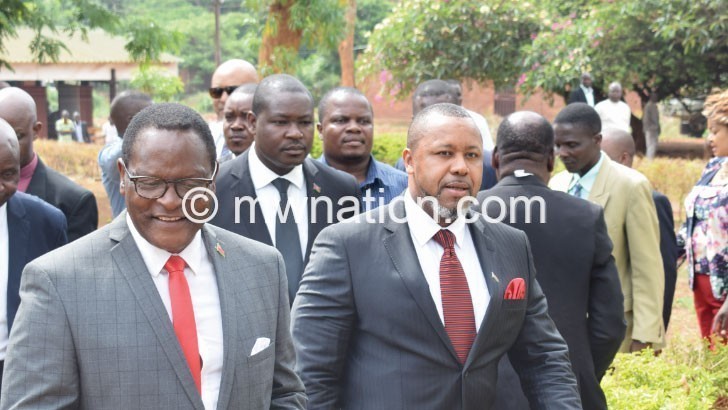What next after court ruling?
Divergent views have emerged on how today’s judgement of the High Court of Malawi sitting as the Constitutional Court in the presidential election nullification petition will affect the presidency, mostly in case of nullification.
In their responses to an enquiry by The Nation, three legal minds interviewed agree that whichever way the judgement will go—nullification or upholding the status quo—President Peter Mutharika will remain in office.
However, the lawyers differ on the position of the Office of the Vice-President, especially in case of nullification, with one suggesting that immediate-past vice-president Saulos Chilima could resume his office and others suggesting that would not be possible, considering that he already served his five-year term of office.

In his response, private practice lawyer John-Gift Mwakhwawa said if the petitioners—Chilima of UTM Party as the first petitioner and Malawi Congress Party (MCP) president Lazarus Chakwera as the second petitioner—get their wish for nullification of presidential election results in the May 21 2019 Tripartite Elections, the presidency will revert to the pre-May 2019 elections status.
He said: “Meaning that Mutharika will remain President and Chilima will be the Vice-President with [current Vice-President]
Everton Chimulilenji expected out until fresh elections are held.”
Mwakhwawa said in the event of nullification, Mutharika could elongate his presidency and Chimulirenji’s chance to continue as his Vice-President by appealing to the Malawi Supreme Court of Appeal and getting a court order to put aside the Constitutional Court decision.
He said: “The respondents [Mutharika and Malawi Electoral Commission-MEC] will have to apply to the court for a stay pending appeal which, if granted, would make Chimulirenji remain as Vice-President until determination of appeal.
“In the event that respondents win [the case], the current status of Mutharika and Chimulirenji will not be affected even if there is an appeal by the petitioners.”
Mwakhwawa’s position is shared by Ngeyi Kanyongolo, an Associate Professor of Law at Chancellor College, a constituent college of the University of Malawi, who said null and void would mean the presidency reverting to where it was before election results were announced, meaning that the then incumbent will be President under the old mandate acquired in May 2014.
She also said in the event of nullification and the respondents appeal the decision as well as obtain a stay of the execution of the ruling, Mutharika and Chimulirenji would continue serving as President and Vice-President.
Said Kanyongolo: “If [the decision is] stayed, the status quo prevails. If not stayed, then it reverts to pre-May 21st. But details will be in ruling.”
But Professor of Law at the University of Cape Town in South Africa, Danwood Chirwa, said the Constitution has a skeleton transition arrangement where only the President remains. He added that even the Cabinet will have to go until a new government is formed.
Quoting Section 83(1) and (2) of the Constitution, he said the presidential term has five years and that the tenure of office for the Vice-President is tied to the same.
Chirwa, thus, dismissed suggestions that Chilima would return to the Office of the Vice-President in the event of a nullification as simplistic and misleading.
He said: “Only the President can go beyond a term for purposes of handing over power. Those saying Chilima would return after the end of his term are not making sense.
“In fact, it is a huge constitutional problem that when the transition is longer than normal, there can be only one person in charge and no Cabinet.
“This points to the urgency of amending the law to envisage power vacuums and the relevant and appropriate transition arrangements.”
Chirwa said parties should negotiate appropriate transition arrangements because the one addressed by the Constitution might not be feasible as it would probably take some time before the fresh elections are held.
He said: “But it is likely it will take time to carry out necessary reforms, reconstituting the MEC and holding fresh elections would make the transitional arrangement not feasible. A proper one has to be negotiated by the respective parties.”
But all the three lawyers agree that the presidential election results would not spar litigations from parliamentary hopefuls who lost in the May 21 Tripartite Elections because despite the evidence that the election was mismanaged, the case in court was only challenging the presidential results.
From 9am today, the five-judge panel comprising Potani, Kamanga, Madise, Kapindu and Tembo will deliver its judgement. Today marks the 45th day of the timeline the judges set to deliver the ruling when they concluded hearing the matter on December 20 2019.
In the case, Chilima and Chakwera, two of the presidential candidates in the May 21 2019 Tripartite Elections, want the court to nullify presidential election results over alleged irregularities, especially in the results management system. Mutharika of Democratic Progressive Party (DPP), who was declared winner of the elections, is the first respondent with MEC as the second respondent.





